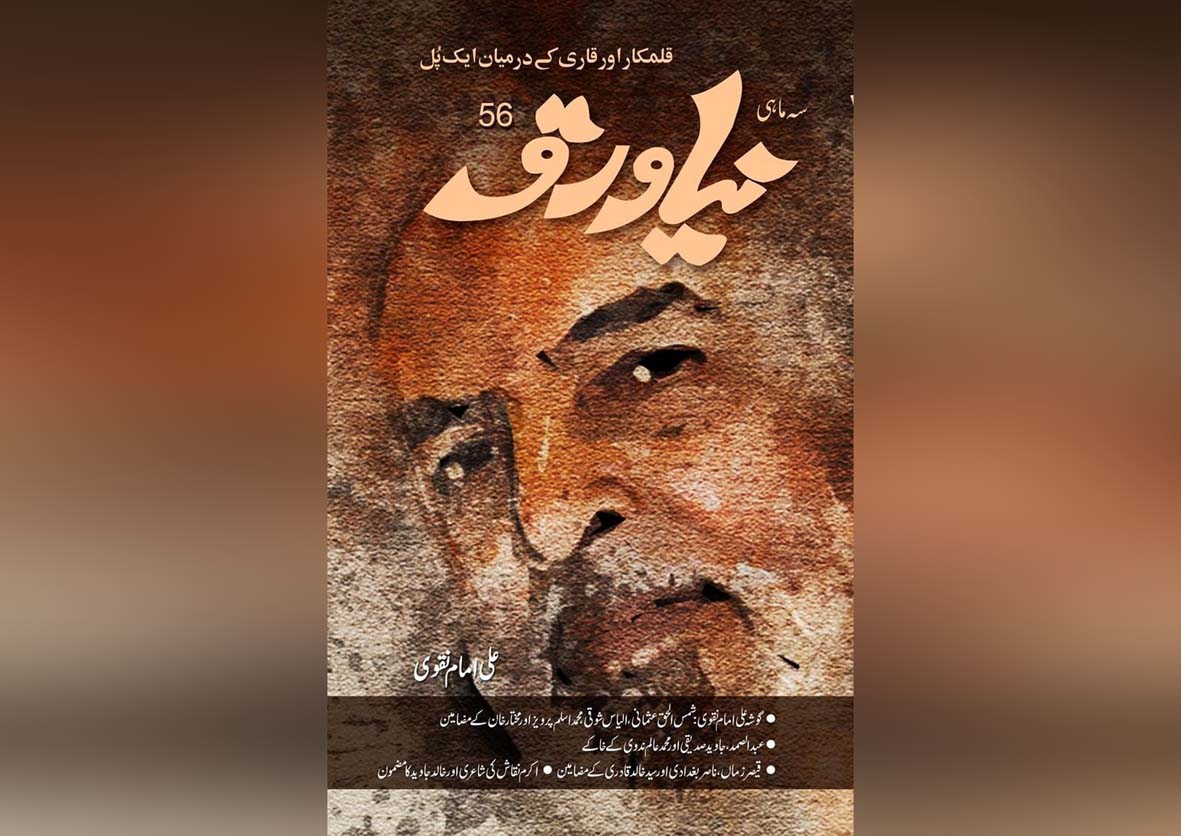Mohd. Tasleem Muntazir
Book Name : Naya Waraq
Editor: Shadab Rashid
Published from: 36/38,
Umerkhadi Cross Lane, Mumbai. 400 009.
Pages: 240
Price: Rs.100
‘Naya Waraq’ (The New Leaf), a quarterly Urdu literary magazine published from Mumbai has been keeping alive its tradition of providing literature of worth to readers. Founded by late Sajid Rashid in late nineties, the magazine is being run by his son Shadab Rashid.
The current issue of the magazine viz ‘Naya Waraq-56’ contains fiction, poetry, articles on various literary topics, book reviews and more. The contents are mostly the portrayal of everyday public life thus having potential to touch the hearts of readers.
There are eight well-knit short stories reflecting different shades of life. ‘Murda Dhoop’ (Dead Sunlight) by Sajid Rashid ripples through various dimensions of human relationships. Our sentiments towards one another and a hidden bond of affection between husband and wife, the intensity of which is manifested when they find their spouse weakened or in pain and distress, are beautifully depicted in this story.
‘Dongarwadi Ke Giddh’ (Vultures of Dongarwadi) by Ali Imam Naqvi revolves around the custom of last rites of Parsis. The sudden disappearance of the vultures that consume corpses as their food has caused a wave of concern among the Parsi community as to where their vultures have gone. This multi-layer short story has also been included in Sahitya Akademy’s bimonthly English journal ‘Indian Literature’ and Muhammad Omar Memon’s compilation of Urdu short stories translated in English. Moreover, a special section on the life and works of Ali Imam Naqvi (1945-2014) is included in this issue (of Naya Waraq).
‘Ek Anokha Sapna’ (A Strange Dream) by Jitendra Billu is about an educated young man who travels from Lucknow to London for fulfillment of his dream and after passing through different phases of hard work becomes successful owner of a restaurant there. The story has message that a determined person can make a dream come true with his hard work and that it is not necessary that every wish of a person of high stature is fulfilled.
Munira Surati’s ‘Boo Jaan’ is story of a widowed mother and her son. The emotions of ‘Boo Jaan’, lifestyle of those living in cramped houses, sphere of their thinking; all these are well illustrated in this story. ‘Eye Contact’ by Anwar Mirza is a story on human thinking swinging between highs and lows. ‘Mera Qusoor Kya Tha’ (What My Fault Was) by Nusrat Shamsi is the story of a boy with girl-like passions who eventually decides to commit suicide out of frustration with his family’s negative attitude towards him.
‘Doosra Janam’ (Rebirth) by Wasim Aqeel Shah is about the hard-hearted owner of a garment factory Mr. Patil whose wife is a religious woman and strongly believes in reincarnation. She is firm on the belief that man has to pay for his good or bad deeds in the next life if not in this life but her words have no impact on Mr. Patil who apparently has a strict attitude towards his employees in order to uphold his principles but makes the widow of a company employee and later his young daughter the victim of his lust. Eventually he seems to have inclined towards her wife’s belief when finds himself at hospital bed.
‘Chennur Mein Parcham Kushaai’ (The Flag-raising in Chennur) is the fiction of Tamil writer Charvakan, real name Hariharan Srinivasan, translated into English by Krishna Sobti and from English into Urdu by Zakia Mashshahdi. Clash of the attitude of present day workers and feelings of a freedom fighter on the occasion of flag hoisting ceremony on Independence Day is the main focus of this story.
Among the articles are Qaiser Zaman’s ‘Lutf-ur-Rahman’s ‘Tanqeed: Ek Baazdeed’ (Lutf-ur-Rahman’s Criticism: A Revisit), Nasir Baghdadi’s ‘Jadeediyat Aur Jadeed Urdu Afsana’ (Modernism and Modern Urdu Fiction), Syed Khalid Qadri’s ‘Zubair Rizvi Ki Yaad Mein’ (In Memory of Zubair Rizvi) and Ali Ahmad Fatmi’s ‘Mithaas Se Bhari Kahaniyaan’ (The Sweetened Stories). The issue also includes reviews on four books and three sketches. The poetry section is excellent in which Poems of Iqbal Nazar, Shahid Mahuli, Farooq Rahib, Rafiq Jafar, Saleem Ansari, Misdaq Azmi and Ghazals of Noman Shauq, Munir Saifi, Nisar Ahmad Nisar, Badr Mohammadi, Muslim Nawaz, Jamaluddin Jamal, Mehran Amrohi, Obaidi and Qureshi Tahir Naeema are included.
Akram Naqqash’s poetry and Khalid Javed’s article on his poetry ‘Akram Naqqash Ki Shaairi: Be-Sahar Raat Ka Chamakta Sitara’ (Akram Naqqash’s Poetry: Shining Star of the Night Having No Dawn) are also included in this issue. Arundhati’ Subramanium’s ten English poems (Urdu translation by Farhan Hanif Warsi) are also part of the poetry section. A worth reading magazine which the readers will like to keep in their regular reading.


